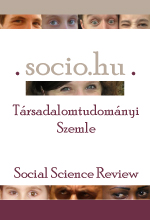Házi ápolók – „új/globális” házicselédek?
Domestic care workers – “new/global” maids?
The metaphor of being a maidservant in two female domestic care worker’s stories
Author(s): Krisztina NémethSubject(s): Social Sciences, Gender Studies, Health and medicine and law, Migration Studies
Published by: MTA TK Szociológiai Intézet
Keywords: domestic worker; maid(servant); domestic care worker; care migration; transnational migration
Summary/Abstract: In this paper, I try to understand what it means to be a domestic care worker by scrutinizing the maid-role associated with this work in the story of two women working in the transnational care economy. Both of them were pensioners when they took on this job: they go (went) to German and Austrian households for 4 or 6 week-long periods of time, and look(ed) after elderly people (single or living together with afamily) in their homes. At a certain point of their story, these women referred tothemselves as maids (domestic servants, maidservants) highlighting the subjectivelyperceived nature of the care work done in foreign households. My question is: whatdoes this mean for them personally and how does the metaphor of being a maid workin their stories? What kind of relationships are revealed and wrapped or masked byusing it? The first part of the study seeks structural parallels, that is, similarities between theposition of the care worker in our times and the position of the former maidservant,which may be considered as a predecessor of this social and economic relation. Myaim is to interpret the subjective meaning of ‘being a maidservant’ by analysing livedexperiences and some hints of these two women’s lifestories and family histories.Both stories are built on a specific dynamic of taking and distancing of the role ofmaidservant, which shows that there is an inner ambiguity in this position, while thissubjectively perceived and constructed parallel between the domestic care workersand former maidservant seems to be rather divergent.
Journal: Socio.hu Társadalomtudományi Szemle
- Issue Year: 6/2016
- Issue No: 4
- Page Range: 26-45
- Page Count: 20
- Language: Hungarian

